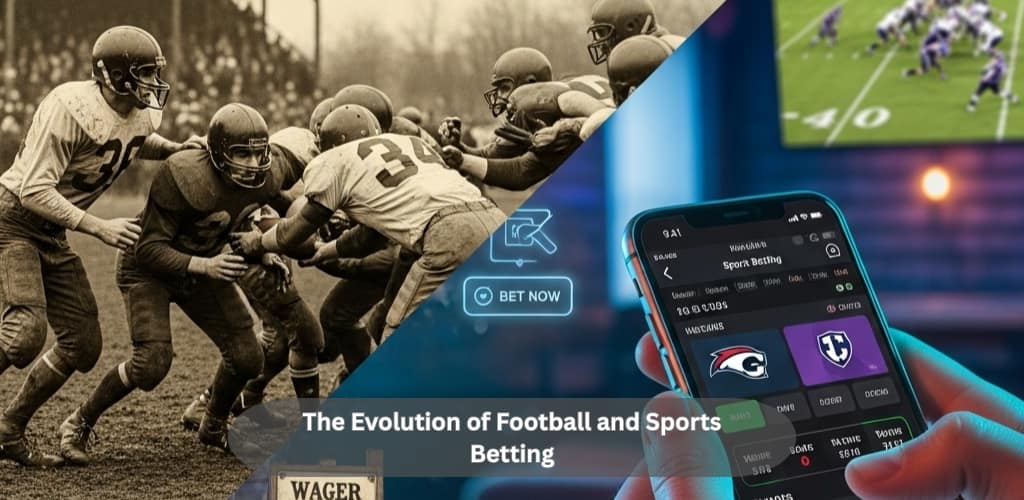Table of Contents
American football started its history without the use of stadium illumination because it evolved from rugby and soccer games played on muddy fields during the 19th century. The game’s basic concept involved moving the ball while defending territory until players reached the goal line or kicked the ball through goalposts.
Walter Camp from Yale University started creating official rules for football during 1879. The “Father of American Football” Walter Camp established three fundamental elements which became the core of the sport: the line of scrimmage and the snap and the down system. The game evolved into a strategic competition through his rule changes which reduced team sizes to eleven players and established specific positions for quarterback and center. The game evolved from disorganized fighting into an organized competitive sport through these rule modifications.
The early 1900s saw Knute Rockne and Glenn “Pop” Warner along with other visionaries work to improve the rules of the game. College football experienced explosive growth in popularity which brought in huge fan attendance and established famous athletic competitions between teams. The American Professional Football Association established itself as the NFL in 1920 which launched a new period for professional football.
The First Professional Sparks
The American Football League (AFL) established itself as the first major professional football league when it started operations in 1960. The inaugural game between Denver Broncos and Boston Patriots marked the beginning of a new sports era in history.
The first AFL touchdown pass went to Denver’s Frank Tripucka while Al Carmichael achieved the first 100-yard receiving game and Gene Mingo scored the first special teams touchdown. The inaugural game established multiple historical records which established the basis for the league to join the NFL during the following decade.
The merger between the leagues established the current sports industry structure which generates billions of dollars through fan enthusiasm and television broadcasts and later added betting operations.
Football Meets the Betting World
The increasing fame of football created an increasing number of people who wanted to place wagers on its games. Sports betting operations under Las Vegas control dominated the market for many years. NFL Sunday wagers attracted visitors to the Strip while local bookies operated discreetly throughout American towns.
The Internet brought about a complete transformation of the world.
A small group of entrepreneurs operating from Costa Rica and Antigua launched the world’s first online sportsbooks during the mid-1990s. The online sportsbooks implemented Vegas casino betting software to create their web-based operations. Users gained the ability to access their accounts and place bets through their computers or mobile devices without needing to step outside their homes.
It was revolutionary. The online betting industry expanded into a worldwide phenomenon during the following few years. The ability to bet through computers and mobile devices brought in millions of new users who found the convenience appealing. Sportsbooks transitioned from their origins as dimly lit backroom operations into modern digital platforms which anyone with internet access could use.
The Digital Transformation
Online sportsbooks evolved into complete entertainment platforms which provided users with multiple betting options during the 2000s. Users could place wagers on football matches and basketball games and baseball contests and World Cup international competitions. Users gained access to casino games and horse racing through a single website without needing to change platforms.
The sports betting platform AmericasBookie.com gained popularity through its backing from RDG Corporation and other major companies. The operators provided betting services while providing white-label and Pay Per Head (PPH) systems to support independent sportsbooks.
The PPH system enabled local bookmakers to access the same level of technology and security features which offshore sites provided. Agents could monitor player bets and handle credit management and provide online betting access to their customers through a small fee per active player. The initial offshore testing of the system developed into an organized worldwide system of independent bookmaking operations.
Technology Shapes the Game
The technological progress that revolutionized football gameplay now drives the development of betting markets. The combination of advanced analytics with real-time data and instant updates has transformed how bettors approach their decision-making process. The odds system now operates in real-time because algorithms and live streaming feeds make continuous adjustments every second. The sportsbook operations now function at the level of a stock exchange through continuous monitoring and continuous market activity.
The same access that professionals used to have is now available to bettors who can use it to gain valuable making predictions has evolved into a science because people no longer need to make random guesses. The ability to information. The smartphone app combines historical statistics with live odds and predictive models for users. The process of detect market patterns at a faster rate than others defines the new approach to football betting.
Football has evolved into a live betting experience which represents the core of contemporary football viewing.
The modern football experience has been transformed by live betting which also operates under the name in-game wagering. The ability to place bets occurs instantly when viewers witness drives and turnovers and injuries during live matches. Every play becomes an opportunity.
The technology which brought sports to television screens now enables fans to actively participate in the action. The Broncos-Chiefs game viewer can place wagers on upcoming touchdowns and field goals and even select the next play to bet on. Football betting has evolved past basic point spreads because of the increased fan involvement that live betting provides.
The process of managing numerous wagers within short timeframes has become a requirement for bookmakers. The viewer experiences football games with enhanced focus because of live betting. The sport of football has evolved into a fast-paced system which combines athletic competition with betting activities.
From Stadiums to Screens
The development of football through time parallels the development of sports wagering. The beginning of both activities started with small-scale operations within their respective local areas. The combination of innovation with risk-taking and flexible approaches led to their expansion. The connection between football fields and sports betting wagers has reached its peak through Walter Camp’s rulebook development and digital sportsbook dashboards.
The worldwide betting lines for football games update instantly during all college bowl matches and Thursday night NFL games. The point spreads and live betting markets that update instantly are influenced by the actions of football players Patrick Mahomes and Josh Allen during games.
Football established the fundamental structure of the sport. The Internet established the fundamental framework. The combination of football and Internet technology has established the most advanced sports betting system in history.
The Game That Never Stops
The history of football spans from Yale’s 19th-century muddy fields to the 2025 mobile sportsbooks while the game continues to transform. The game underwent rule changes while its athletes developed and spectators learned to adjust. The path of betting through history mirrored the development from hidden rooms to high-speed internet access.
The upcoming years will introduce fresh betting formats and speedier platforms and interactive wagering options. The fundamental elements of betting remain unchanged because they consist of strategic planning and risk-taking alongside the excitement of wagering. The modern connection between football history and betting future exists in the same playing field where fans analyze past box scores and place current wagers.




